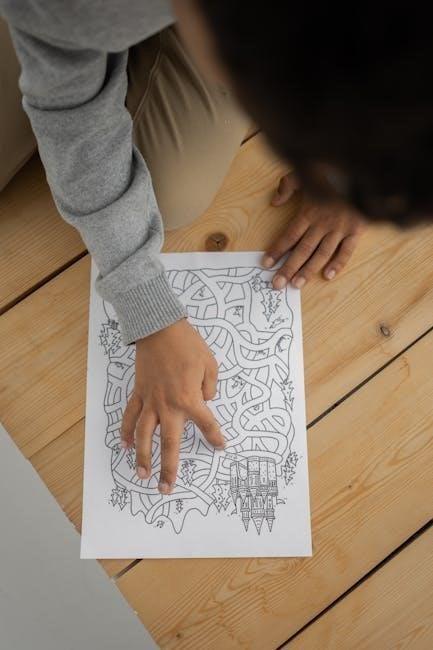
philosophically correct worksheet answers pdf
Philosophically correct worksheets are educational tools designed to foster critical thinking, ethical reasoning, and logical analysis. They encourage students to explore complex ideas through structured, thought-provoking exercises.
1.1 Definition and Purpose
Philosophically correct worksheets are educational resources designed to guide students in exploring fundamental questions and concepts through structured exercises. These tools aim to promote critical thinking, ethical reasoning, and logical analysis, encouraging learners to engage deeply with philosophical ideas. Their purpose is to foster intellectual curiosity and the ability to articulate well-reasoned arguments. By focusing on clarity and coherence, they help students develop a systematic approach to problem-solving and decision-making. These worksheets often include prompts that challenge assumptions and encourage the examination of multiple perspectives, making them invaluable for developing a philosophical mindset. Their ultimate goal is to empower individuals to think independently and ethically in various contexts.
1.2 Importance in Educational Contexts
Philosophically correct worksheets play a vital role in educational settings by fostering critical thinking and ethical reasoning. They encourage students to engage with complex ideas, promoting a deeper understanding of philosophical concepts. These tools are particularly valuable for developing problem-solving skills, as they often present real-world dilemmas that require logical analysis. By incorporating such exercises, educators can help students cultivate empathy and understanding of diverse perspectives. This approach not only enhances academic performance but also prepares learners to navigate ethical challenges in their personal and professional lives. The structured nature of these worksheets ensures that students develop a systematic approach to reasoning, making them indispensable in modern education.
1.3 Overview of the Concept of “Philosophically Correct”
The term “philosophically correct” refers to the alignment of ideas and reasoning with established philosophical principles. It emphasizes the use of logic, ethical considerations, and critical analysis to arrive at well-founded conclusions. This concept encourages the exploration of fundamental questions about existence, morality, and knowledge. By adhering to philosophical correctness, individuals can engage in more meaningful and structured discussions, avoiding fallacies and biases. The approach promotes intellectual rigor and respect for diverse perspectives, fostering a deeper understanding of complex issues. Through this lens, educational materials like worksheets become tools for cultivating not just knowledge, but also wisdom and ethical awareness.

Key Concepts in Philosophical Correctness
Philosophical correctness involves logic, ethics, and reasoning. It emphasizes critical thinking, rationality, and coherence to ensure arguments are sound and conclusions are justifiable.
2.1 Etymology of “Philo” and Its Relevance
The term “philo” originates from Greek, meaning “love” or “affinity.” In the context of philosophy, it signifies a deep passion for wisdom and knowledge. This etymological root underscores the essence of philosophical inquiry, which is driven by a desire to explore and understand fundamental truths. The relevance of “philo” lies in its ability to encapsulate the intrinsic human curiosity that fuels intellectual and ethical investigations; By embracing this concept, philosophically correct worksheets encourage learners to cultivate a similar passion for critical thinking and ethical reasoning, fostering a mindset that values wisdom and intellectual growth.
2.2 Branches of Philosophy Related to Correct Reasoning
Logic, epistemology, and ethics are key branches of philosophy that underpin correct reasoning. Logic focuses on the principles of valid argumentation, ensuring conclusions are drawn from premises accurately. Epistemology explores the nature of knowledge and belief, guiding learners to distinguish justified beliefs from unfounded assumptions. Ethics examines moral principles, fostering reasoning that aligns with ethical standards. These branches collectively enhance critical thinking, enabling individuals to evaluate arguments, identify fallacies, and make informed decisions. By integrating these philosophical areas, worksheets encourage a holistic approach to reasoning, promoting intellectual rigor and moral awareness in problem-solving scenarios.
2.3 The Role of Logic in Philosophical Correctness
Logic plays a central role in philosophical correctness by providing a framework for reasoning, argumentation, and problem-solving. It equips individuals with tools to evaluate statements, identify fallacies, and construct coherent arguments. Through logical principles, learners can distinguish between valid and invalid reasoning, ensuring their conclusions are sound and well-supported. Logical correctness also enhances critical thinking, enabling students to approach complex philosophical questions systematically. By mastering logical structures, such as syllogisms and propositional logic, individuals can apply these skills to real-world scenarios, fostering clarity and precision in their thinking. This foundational aspect of philosophy is essential for developing ethical and morally sound reasoning in various educational contexts.

Educational Strategies for Philosophically Correct Worksheets
Educational strategies involve fostering critical thinking, ethical reasoning, and logical analysis through structured exercises. They encourage students to engage with complex ideas and apply them practically.
3.1 Designing Worksheets for Critical Thinking
Designing worksheets for critical thinking involves creating structured exercises that encourage students to analyze information, evaluate arguments, and form well-supported conclusions. These worksheets often include open-ended questions, ethical dilemmas, and logical puzzles to stimulate deeper understanding. By incorporating real-world examples, students can apply theoretical concepts to practical scenarios, fostering a more engaged and reflective learning process. Clear instructions and logical sequencing of exercises help students build their reasoning skills progressively. Such worksheets aim to develop independent thinking, enabling learners to approach problems with a philosophical mindset and arrive at philosophically correct answers.
3.2 Incorporating Ethical and Moral Reasoning
Incorporating ethical and moral reasoning into worksheets ensures students engage with philosophical principles that guide decision-making. Exercises often present ethical dilemmas, prompting learners to analyze situations, weigh consequences, and justify their choices. These activities encourage empathy, understanding of diverse perspectives, and the application of moral frameworks. By integrating real-life scenarios, worksheets help students connect abstract concepts to practical contexts, fostering a deeper appreciation for ethical inquiry. Structured discussions and reflective writing prompts further enhance the development of moral reasoning skills, preparing students to address complex issues thoughtfully and philosophically.
3.3 Using Real-World Examples for Practical Application
Using real-world examples in philosophically correct worksheets bridges theoretical concepts with practical scenarios, enhancing students’ ability to apply philosophical ideas to everyday life. These examples, often drawn from current events or common experiences, make abstract principles more relatable and accessible. Worksheets might include ethical dilemmas, case studies, or historical events, prompting students to analyze and resolve issues using philosophical frameworks. This approach fosters critical thinking, problem-solving, and decision-making skills. By grounding exercises in real-world contexts, educators help students understand the relevance of philosophical inquiry to their own lives, encouraging a deeper engagement with complex ideas and their practical implications.

Historical and Cultural Contexts
Historical and cultural contexts shape philosophical thought, influencing how concepts are taught and understood across different societies and time periods.
4.1 The Evolution of Philosophical Thought
Philosophical thought has evolved significantly over centuries, shaped by diverse cultural and historical contexts. From ancient Greek philosophers like Socrates and Plato to modern thinkers, ideas have transformed. Early philosophers focused on metaphysics and ethics, while later movements emphasized logic, rationalism, and existentialism. Cultural influences, such as Eastern philosophy, have also enriched global perspectives. This evolution reflects humanity’s ongoing quest for meaning, truth, and understanding, adapting to societal changes and intellectual advancements. The study of these developments is crucial for creating philosophically correct worksheets, as they provide a foundation for critical and ethical reasoning.
4.2 Cultural Influences on Philosophical Ideas
Cultural influences have profoundly shaped philosophical ideas across history. Eastern philosophies, such as Buddhism and Taoism, emphasize harmony and balance, while Western traditions like Greek philosophy focus on reason and logic. Indigenous cultures often integrate spiritual and communal values into their philosophical frameworks. These diverse perspectives enrich global thought, highlighting universal questions about existence, ethics, and knowledge. For instance, Confucianism stresses social harmony, while Aristotelian philosophy prioritizes rational inquiry. Recognizing these cultural contributions fosters a deeper understanding of philosophical correctness, encouraging worksheets to incorporate varied viewpoints and promote cross-cultural dialogue. This inclusivity ensures that educational materials reflect the richness of global philosophical traditions.
4.3 Historical Figures and Their Contributions
Historical figures have played a pivotal role in shaping philosophical thought. Plato and Aristotle laid the groundwork for Western philosophy, with Plato’s theory of forms and Aristotle’s emphasis on empirical observation. Eastern philosophers like Confucius and Buddha introduced concepts of morality, harmony, and mindfulness. Modern thinkers such as Kant and Nietzsche expanded ideas on ethics and human existence. These figures’ contributions provide foundational knowledge for philosophically correct worksheets, enabling students to engage with timeless ideas. By incorporating their teachings, worksheets promote a deeper understanding of philosophical principles and their relevance to contemporary issues. This approach ensures that historical wisdom remains accessible and applicable in educational settings.

Practical Applications of Philosophical Correctness
Philosophical correctness applies to problem-solving, decision-making, and ethical dilemmas. It ensures logical reasoning and moral clarity, making abstract concepts practical in real-world scenarios and educational contexts.

5.1 Problem-Solving and Decision-Making
Philosophically correct worksheets enhance problem-solving and decision-making by fostering logical reasoning and ethical consideration. They encourage students to analyze complex issues from multiple perspectives, promoting critical thinking. By integrating philosophical principles, these tools help individuals evaluate arguments, identify biases, and develop well-rounded solutions. The worksheets often include real-world scenarios, enabling learners to apply abstract concepts to practical dilemmas. This approach not only improves cognitive skills but also cultivates moral awareness, essential for making informed, ethical decisions. Additionally, collaborative exercises encourage teamwork, as students compare answers and refine their reasoning through dialogue. Such activities prepare individuals to navigate challenges thoughtfully and responsibly in both academic and real-life contexts.
5.2 Enhancing Communication Skills
Philosophically correct worksheets play a significant role in enhancing communication skills by encouraging thoughtful dialogue and clear expression of ideas. These tools often incorporate exercises that prompt students to articulate their reasoning, fostering clarity and precision in their language. Group discussions based on worksheet prompts help learners practice active listening and respond constructively to others’ perspectives. By engaging with diverse viewpoints, students develop empathy and refine their ability to convey complex ideas effectively. Such activities not only improve verbal and written communication but also prepare individuals to engage respectfully in intellectual debates and collaborative problem-solving. Enhanced communication skills are vital for fostering understanding and collaboration in both academic and real-world settings.
5.3 Fostering Empathy and Understanding
Philosophically correct worksheets are designed to cultivate empathy and understanding by encouraging students to consider multiple perspectives and engage with diverse ethical viewpoints. Through structured exercises, learners are prompted to analyze situations from different cultural and moral frameworks, fostering a deeper appreciation for varied experiences. Activities such as role-playing ethical dilemmas or reflecting on real-world scenarios help students develop compassion and reduce biases. By exploring philosophical concepts like empathy and altruism, these worksheets empower individuals to connect with others on a deeper level. This approach not only enhances interpersonal relationships but also prepares students to navigate complex social and cultural contexts with sensitivity and inclusivity.

Worksheet Examples and Case Studies
This section provides diverse worksheet examples, case studies, and real-world applications, demonstrating effective implementation across various educational settings and age groups.
6.1 Sample Worksheets for Different Age Groups
Sample worksheets are tailored to meet the cognitive and developmental needs of students across different age groups. For younger learners, activities focus on basic conceptual understanding, such as identifying colors or simple ethical dilemmas. Intermediate worksheets incorporate logical reasoning exercises, while advanced versions delve into complex philosophical theories. Examples include worksheets on moral decision-making, critical thinking puzzles, and case studies that encourage empathy. These materials are designed to be adaptable, ensuring engagement and comprehension. By aligning content with age-specific learning objectives, educators can effectively foster philosophical thinking from an early age.
6.2 Case Studies of Successful Implementation
Successful implementation of philosophically correct worksheets has been observed in various educational settings. For instance, a middle school in California reported improved critical thinking skills among students after incorporating these worksheets into their curriculum. Similarly, a high school in New York successfully integrated ethical reasoning exercises, leading to enhanced problem-solving abilities. Universities have also adopted these tools, with one institution noting increased student engagement in philosophical discussions. These case studies highlight the effectiveness of tailored worksheets in fostering logical and moral reasoning. Educators have praised the adaptability of these resources, allowing them to address diverse learning needs while maintaining academic rigor. Such implementations serve as models for other institutions seeking to enhance philosophical education.
6.3 Analyzing Common Mistakes and Solutions
Common mistakes in philosophically correct worksheets often stem from superficial analysis or misinterpretation of ethical dilemmas. Students may overlook underlying principles or fail to provide evidence-based reasoning. To address this, educators emphasize the importance of thorough examination and logical structure. Solutions include encouraging students to question assumptions, use real-world examples, and reflect on multiple perspectives. Providing clear guidelines and sample answers helps clarify expectations. Additionally, fostering a collaborative environment where students discuss their reasoning can reduce errors. By addressing these challenges, educators can enhance the effectiveness of philosophically correct worksheets in developing critical and ethical thinking skills. Regular feedback and iterative learning further refine students’ abilities, ensuring deeper understanding and improved outcomes.

The Role of Technology in Philosophical Education
Technology enhances philosophical education by providing digital tools for creating interactive worksheets, accessing online resources, and fostering collaborative learning environments that promote critical thinking and ethical reasoning.
7.1 Digital Tools for Creating Worksheets
Digital tools like Google Docs, Canva, and specialized educational software enable educators to design interactive and visually appealing worksheets. These platforms offer templates, collaboration features, and real-time feedback, enhancing the creation process. Tools such as Kahoot and Mentimeter allow for interactive philosophical exercises, fostering engagement and critical thinking. Additionally, software like QGIS, while primarily for geospatial analysis, demonstrates how technology can adapt to various educational needs. These resources streamline the development of philosophically correct worksheets, ensuring they are both intellectually stimulating and accessible for diverse learners. By leveraging these tools, educators can create dynamic, thought-provoking materials that align with philosophical principles and promote deeper understanding.
7.2 Online Resources for Philosophical Learning
Online resources provide educators and students with accessible tools for philosophical learning. Platforms like Google Docs and Canva offer templates for creating worksheets, while educational journals and websites supply theoretical frameworks. QGIS and related apps, such as QField and Mergin Maps, demonstrate practical applications of philosophical concepts in real-world scenarios. Additionally, digital libraries and open-access publications offer comprehensive materials for exploring philosophical ideas. These resources support interactive and immersive learning experiences, enabling users to engage with philosophical principles in a dynamic and meaningful way. By leveraging these tools, educators can craft worksheets that align with philosophical correctness, fostering critical thinking and ethical reasoning.
7.3 The Future of Philosophical Education
The future of philosophical education lies in integrating advanced technologies and digital tools. Platforms like QField and Mergin Maps revolutionize field data collection, bridging theoretical concepts with practical applications. As macOS and iOS continue to evolve, philosophers can leverage these systems for immersive learning experiences. Open-access resources and educational apps ensure accessibility for diverse learners. The rise of interactive worksheets and real-time collaboration tools promises to enhance critical thinking and ethical reasoning. By embracing these innovations, philosophical education will become more dynamic, engaging, and inclusive, preparing students to navigate complex global challenges with clarity and empathy. This evolution ensures that philosophical correctness remains a cornerstone of modern education.

Challenges and Solutions
Addressing misconceptions and diverse learning needs requires adaptive strategies, ensuring philosophically correct worksheets remain accessible and effective for all learners, fostering inclusive educational environments.
8.1 Common Misconceptions About Philosophical Correctness
One common misconception is that philosophical correctness implies a single “right” answer, stifling creativity. In reality, it encourages exploration of diverse perspectives while maintaining logical coherence. Another misunderstanding is that it focuses solely on abstract theory, neglecting practical application. Philosophically correct worksheets often incorporate real-world examples to bridge theory and practice. Additionally, some believe it discourages personal opinions, when in fact, it promotes well-reasoned arguments. Addressing these misconceptions involves clarifying the balance between critical thinking and creative expression, ensuring that educational tools foster both intellectual rigor and inclusivity of thought.
8.2 Addressing Diverse Learning Needs
Philosophically correct worksheets must accommodate diverse learning needs to ensure inclusivity and effectiveness. This involves creating materials that cater to different cognitive abilities, learning styles, and cultural backgrounds. Incorporating visual, auditory, and kinesthetic elements can engage various learners. Additionally, offering tiered assignments allows educators to tailor challenges to individual student capacities. Providing clear instructions and examples helps bridge gaps for those with varying prior knowledge. Real-world applications make concepts relatable to students from diverse backgrounds. Implementing differentiated instruction ensures that all learners can engage meaningfully, fostering an inclusive and supportive educational environment. By addressing these needs, philosophically correct worksheets promote equitable access to philosophical education.
8.3 Overcoming Resistance to Philosophical Thinking

Resistance to philosophical thinking often arises from its abstract nature or perceived irrelevance to daily life. To overcome this, educators can emphasize real-world applications, making concepts relatable and practical; Encouraging open discussions and debates fosters engagement and helps students see the value of critical inquiry. Providing clear examples and guided exercises can demystify complex ideas, reducing intimidation. Additionally, incorporating interdisciplinary connections shows how philosophy intersects with other subjects, enhancing relevance. Recognizing and addressing students’ skepticism or discomfort creates a safe space for exploration. By aligning philosophical activities with learning objectives and outcomes, educators can demonstrate their importance, gradually building students’ appreciation for philosophical thinking.
Philosophically correct worksheets empower learners by fostering critical thinking and ethical reasoning, with future directions likely involving enhanced digital integration for broader educational impact.
9.1 Summarizing Key Takeaways
Philosophically correct worksheets emphasize critical thinking, ethical reasoning, and logical analysis, fostering deeper understanding and practical application. They encourage students to engage with complex ideas, promoting empathy and collaboration. By integrating real-world examples, these tools enhance problem-solving skills and decision-making abilities. The incorporation of technology, such as digital worksheets, ensures accessibility and modernization of philosophical education. Overcoming challenges like misconceptions and resistance requires innovative strategies and inclusive designs. Future directions include expanding digital resources and encouraging lifelong exploration of philosophical concepts. These worksheets serve as a foundation for intellectual growth, empowering learners to navigate ethical dilemmas and societal issues with clarity and confidence.
9.2 The Future of Philosophically Correct Worksheets
The future of philosophically correct worksheets lies in their integration with technology and adaptive learning tools. As digital platforms evolve, these worksheets will become more interactive, offering personalized learning experiences. The use of real-time feedback and AI-driven assessments will enhance their effectiveness. Collaborations between educators and philosophers will ensure content remains relevant and thought-provoking. Accessibility will improve, with cloud-based solutions allowing global distribution. The focus will shift toward fostering empathy and interdisciplinary connections, preparing students for complex global challenges. By embracing innovation, philosophically correct worksheets will continue to inspire critical thinking and ethical reasoning, shaping the next generation of thinkers and leaders.
9.3 Encouraging Continued Exploration
Encouraging continued exploration is essential for deepening understanding of philosophically correct worksheets. Educators should promote curiosity by integrating real-world examples and fostering a love for lifelong learning. Providing access to diverse resources, such as online forums and interdisciplinary texts, can inspire students to delve deeper into philosophical concepts. Encouraging participation in debates and discussions helps refine critical thinking skills. Recognizing progress and creativity motivates learners to explore further. By creating a supportive environment, educators can empower students to embrace the richness of philosophical inquiry, leading to personal growth and intellectual development. This approach ensures that the lessons from these worksheets extend beyond the classroom, fostering a mindset of continuous exploration and reflection.